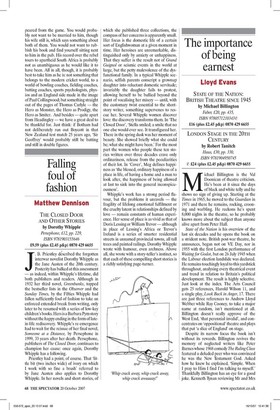Falling foul of fashion
Matthew Dennison THE CLOSED DOOR AND OTHER STORIES by Dorothy Whipple Persephone, £12, pp. 229, ISBN 9781903155646 £9.59 (plus £2.45 p&p) 0870 429 6655 J. B. Priestley described the forgotten interwar novelist Dorothy Whipple as the Jane Austen of the 20th century. Posterity has balked at this assessment — as indeed, within Whipple's lifetime, did both publishers and readers. Although in 1932 her third novel, Greenbanks, topped the bestseller lists in the Observer and the Sunday Times, by the Fifties Whipple had fallen sufficiently foul of fashion to take an enforced extended break from writing, only later to be resumed with a series of low-key children's books. Hers is a Barbara Pym story without the happy ending in the form of latein-life rediscovery. Whipple's re-emergence had to wait for the reissue of her final novel, Someone at a Distance, by Persephone in 1999, 33 years after her death. Persephone, publishers of The Closed Door, continues to champion her cause: once again, Dorothy Whipple has a following.
Priestley had a point, of course. That 'little bit (two inches wide) of ivory on which I work with so fine a brush' referred to by Jane Austen also applies to Dorothy Whipple. In her novels and short stories, of which she published three collections, the compass of her concerns is apparently small. Her focus is the domestic life of a certain sort of Englishwoman at a given moment in time. Her heroines are unremarkable, distinguished only by anxiety or unhappiness. That they suffer is the result not of Grand Guignol or seismic events in the world at large, but the petty malevolence of the dysfunctional family. In a typical Whipple sce nario, selfish parents conscript a grownup daughter into reluctant domestic servitude; invariably the daughter fails to protest, allowing herself to be bullied beyond the point of vocalising her misery — until, with the customary twist essential to the shortstory writer, something supervenes to rescue her. Several Whipple women discover love: the discovery transforms them. In 'The Closed Door', 'Stella smiled; a smile that no one else would ever see. It transfigured her. There in the spring dusk was her moment of beauty. She showed briefly what she could be; what she might have been.' For the most part the women who people these ten stories written over three decades crave only ordinariness, release from the peculiarities of their lot. In 'Cover', Meg defines happiness as 'the blessed, ordinary happiness of a place in life, of having a home and a man to look after, the happiness of being allowed at last to sink into the general inconspicuousness'.
Whipple's work has a strong period flavour, but the problems it unravels — the fragility of lifelong emotional fulfilment or the cruelty latent in relationships defined by love — remain constants of human experience. Her sense of place is as vivid as that of Doris Lessing or William Trevor — although in place of Lessing's Africa or Trevor's Ireland is a series of smarter residential streets in unnamed provincial towns, all tall trees and painted railings. Dorothy Whipple wrote with humour, even archness. Above all, she wrote with a story-teller's instinct, so that each of these compelling short stories is a richly satisfying page-turner.







































































 Previous page
Previous page